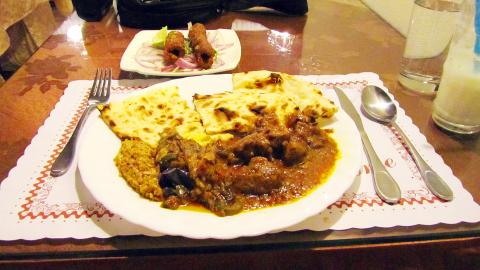Ali Baba’s has long been a fixture on Nanjing East Road, serving up some of the best Indian food to be found in Taipei. In truth there isn’t much competition, with visits to other curry restaurants in
the capital tending to provide dining experiences running from the disappointing to the downright awful.
The decor at Ali Baba’s is showing its age a bit — and dark brown is perhaps not the most inspiring choice of paint color for the ceiling — but the food consistently hits the mark, a fact highlighted by the number of South Asian habitues.

PHOTO: TONY PHILLIPS, TAIPEI TIMES
If you are unfamiliar with Indian food, the extensive buffet is a good way of testing the culinary waters. There are mutton, chicken, seafood and vegetable curries, chutneys, different types of starters, rice, naan bread and even desserts and fruit. In short, if you’re unable to find something to suit your tastes, Indian food probably isn’t for you.
The buffet, which is usually only served at lunchtime on weekends, costs NT$399 plus service. If the latter charge seems odd for a serve yourself affair, soft drinks such as cola, tea or lassi (a sweet, salty or mango-flavored yogurt drink) are included in the price and will be brought to you by a waiter. Service is invariably willing and friendly.
The a la carte menu contains the usual Indian restaurant staples such as tandoori mixed grill, saag gosht (a spiced mutton and spinach dish), assorted birianis and even a few fish dishes.
There is a fair selection of vegetarian options, including palak paneer, which marries spinach and cubes of paneer, a very mild South Asian cheese with a consistency somewhere between tofu and feta cheese.
The naan breads are freshly baked and include keema naan (stuffed with mincemeat) and garlic naan.
Alcohol is not served, but you can bring your own.
My most recent visit, on a Saturday evening, brought the pleasant surprise of the buffet being available, although the waiter said this was a one-off.
I decided to load up on starters opting for the tandoori chicken, vegetable samosas, pakoras and naan. The dryish, somewhat spicy chicken was nicely complemented by the fresh tasting rings of slightly caramelized onions that it
came with.
The samosas — triangular-shaped pastries stuffed with potato and peas — and pakoras — a kind of onion fritter — were crisp and mildly spiced, accompanied by a somewhat sweet, light green mint and yogurt sauce.
I then tried the mutton korma, accompanied by eggplant curry, daal (a lentil dish), seekh kebab and more naan. Rice may have proven a better option second time round as the naan is filling, especially when combined with the rich korma.
None of the dishes was overly spicy, but if that’s your thing you can always go for the vindaloo on the a la carte menu.
Adding to the authenticity of the experience, there’s a TV screen in the dining area which often has Bollywood style music videos playing or sometimes cricket.
Occasionally the ambience may be disturbed by a shrill squawking, but fear not, it’s only the resident macaw, who from time to time makes an appearance on his perch.

Following the rollercoaster ride of 2025, next year is already shaping up to be dramatic. The ongoing constitutional crises and the nine-in-one local elections are already dominating the landscape. The constitutional crises are the ones to lose sleep over. Though much business is still being conducted, crucial items such as next year’s budget, civil servant pensions and the proposed eight-year NT$1.25 trillion (approx US$40 billion) special defense budget are still being contested. There are, however, two glimmers of hope. One is that the legally contested move by five of the eight grand justices on the Constitutional Court’s ad hoc move

Stepping off the busy through-road at Yongan Market Station, lights flashing, horns honking, I turn down a small side street and into the warm embrace of my favorite hole-in-the-wall gem, the Hoi An Banh Mi shop (越南會安麵包), red flags and yellow lanterns waving outside. “Little sister, we were wondering where you’ve been, we haven’t seen you in ages!” the owners call out with a smile. It’s been seven days. The restaurant is run by Huang Jin-chuan (黃錦泉), who is married to a local, and her little sister Eva, who helps out on weekends, having also moved to New Taipei

The Directorate-General of Budget, Accounting and Statistics (DGBAS) told legislators last week that because the Chinese Nationalist Party (KMT) and Taiwan People’s Party (TPP) are continuing to block next year’s budget from passing, the nation could lose 1.5 percent of its GDP growth next year. According to the DGBAS report, officials presented to the legislature, the 2026 budget proposal includes NT$299.2 billion in funding for new projects and funding increases for various government functions. This funding only becomes available when the legislature approves it. The DGBAS estimates that every NT$10 billion in government money not spent shaves 0.05 percent off

Dec. 29 to Jan. 4 Like the Taoist Baode Temple (保德宮) featured in last week’s column, there’s little at first glance to suggest that Taipei’s Independence Presbyterian Church in Xinbeitou (自立長老會新北投教會) has Indigenous roots. One hint is a small sign on the facade reading “Ketagalan Presbyterian Mission Association” — Ketagalan being an collective term for the Pingpu (plains Indigenous) groups who once inhabited much of northern Taiwan. Inside, a display on the back wall introduces the congregation’s founder Pan Shui-tu (潘水土), a member of the Pingpu settlement of Kipatauw, and provides information about the Ketagalan and their early involvement with Christianity. Most